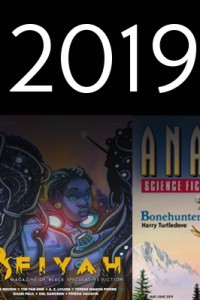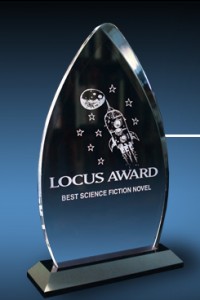2017 and Other Years That We Barely Survived (in Fiction) by Jonathan Strahan
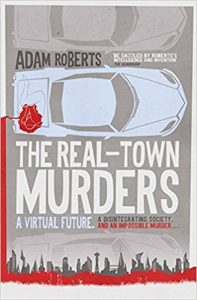 [Editor’s note: part of our 2017 year-in-review essay series from the February 2018 issue of Locus]
[Editor’s note: part of our 2017 year-in-review essay series from the February 2018 issue of Locus]
The best science fiction of 2017 fell into one of two camps: tales of climate change or stories of colonizing our solar system. Kim Stanley Robinson’s magisterial New York 2140, a personal pick for best novel of the year, showed everyone a way forward on how to discuss climate change and our collective future in the collapsing Anthropocene. Humorous, thoughtful, provocative and, above all, optimistic, it told of a world where ocean levels have risen 70 feet in 120 years and where life in the intertidal is all. Paul McAuley’s powerful Austral, set in an Antarctica that has warmed, melted, and been reimagined by ecopoets is in its own way almost equally good. And then there was the debut of the year, Annalee Newitz’s Autonomous, a Captain-Nemo-meets-Breaking-Bad story of a woman trying to make patented medicines freely available in a world where human effort is nakedly a commodity and where climate change has remade the world. These three books, along with novels like James Bradley’s fine young-adult The Silent Invasion (a rare book where I can’t wait for the sequel), Cat Sparks’s fine post-Mad Max adventure Lotus Blue, and Christopher Brown’s Tropic of Kansas, were part of science fiction’s most immediate response to changes in the world around us.
The other major science fictional concern for 2017 looked beyond Earth to a time when humanity has found its way off-world and has begun to occupy the Solar System. Possibly best exemplified by SyFy’s fine adaptation of James S.A. Corey’s Expanse series, which with season two became the best science fiction on television, this colonized solar system fiction has become the plausible go-to for mid-future SF if it is making any attempt to connect to the real world. The best examples of this in 2017 could be found in two lunar novels. Ian McDonald, who has been making a case for being the best SF writer in the world, delivered the second in his Luna series, Wolf Moon, which deftly and powerfully continued the saga of the Corta family and their ‘Game of Domes’ (as the PR would have it), while John Kessel’s wonderful and unexpected The Moon and the Other looked at gender identity, politics, and social conflict in one of the novels of the year. It’s also hard to overlook the latest book of the Expanse, James S.A. Corey’s powerfully entertaining Persepolis Rising, which took the popular series in a new direction.
There were other strong science fiction novels published during the year that fell outside these categories, or only touched on climate change or our leap offworld. Adam Roberts, consistently one of our best science fiction writers, followed his stunning The Thing Itself with an AI murder mystery, The Real-Town Murders, which puzzled, confounded, and rewarded. Ann Leckie revisited her Ancillary universe with stand-alone Provenance, which confirmed, if it was necessary, that she has already matured into one of our pre-eminent writers, while Yoon Ha Lee delivered Raven Stratagem, a satisfying middle volume to Lee’s debut space opera series. And I’m not sure it qualifies as SF, but Daryl Gregory’s Spoonbenders, about the magical Telemachus family, was simply a delight from start to finish. I’d also strongly recommend Kameron Hurley’s first space opera, The Stars Are Legion, and Ken Macleod’s latest, Emergence, which concludes the Corporation Wars series.
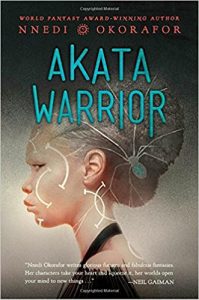 I read far less fantasy than science fiction in 2017 so my observations and recommendations are spottier and a little more personal. Frances Hardinge has rapidly become one of my favorite writers and A Skinful of Shadows, a fantasy mystery set during the English Civil War, is one of her best. Even better, though, was Philip Pullman’s return to Oxford and the world of Dust, La Belle Sauvage. While The Amber Spyglass was never quite the book I wanted it to be, this opening volume of The Book of Dust was the book I have been waiting for ever since I finished The Golden Compass for the first time. An unalloyed delight. Kij Johnson’s visit to The River Bank, where two middle-aged ladies join Rat and Mole in the world of The Wind in the Willows, was an unexpected pleasure that opened up and expanded on the original while capturing Grahame’s lightness of touch. One of the very best novels of any kind published during the year, Mohsin Hamed’s Exit West has been widely praised elsewhere, but this remarkable tale of migration and mutation was the must-read novel that should make major genre awards but may not. Essential reading. Also outstanding was Saad Z. Hossain’s second novel, Djinn City, which was a funny, satirical, and weird entrée into a dense and chaotic Bangladesh that no reader will soon forget. I avoided reading Sarah Rees Brennan’s In Other Lands, an expansion of an online project of hers, because I didn’t like the cover. Stupid of me. It’s a funny, smart, and engaging Narnia of a novel that was a highlight of the end of the year for me. My thanks to Colleen Mondor for the enthusiastic recommendation. Nnedi Okorafor returned to the world of Akata Witch, deepening and expanding Sunny Nwazue’s story in Akata Warrior, a novel that exceeded my expectations (which is saying something, given how much I loved the first book), and Garth Nix’s Frogkisser! was hugely enjoyable and delightful. Perhaps an odd fit on this list, but lead Mountain Goat John Darnielle’s second novel, Universal Harvester, was a dark, nostalgic puzzle-box of a story that I loved. Of course, his record Goths also stood among my best of the year, so I may be biased. Walter Jon Williams delivered a fun swashbuckler, Quillifer, that I finished in Helsinki and discussed with him as part of a live podcast. I await the sequel. I also greatly enjoyed Angela Slatter’s second Verity Fassbinder book, Corpselight, which any reader of urban fantasy should love.
I read far less fantasy than science fiction in 2017 so my observations and recommendations are spottier and a little more personal. Frances Hardinge has rapidly become one of my favorite writers and A Skinful of Shadows, a fantasy mystery set during the English Civil War, is one of her best. Even better, though, was Philip Pullman’s return to Oxford and the world of Dust, La Belle Sauvage. While The Amber Spyglass was never quite the book I wanted it to be, this opening volume of The Book of Dust was the book I have been waiting for ever since I finished The Golden Compass for the first time. An unalloyed delight. Kij Johnson’s visit to The River Bank, where two middle-aged ladies join Rat and Mole in the world of The Wind in the Willows, was an unexpected pleasure that opened up and expanded on the original while capturing Grahame’s lightness of touch. One of the very best novels of any kind published during the year, Mohsin Hamed’s Exit West has been widely praised elsewhere, but this remarkable tale of migration and mutation was the must-read novel that should make major genre awards but may not. Essential reading. Also outstanding was Saad Z. Hossain’s second novel, Djinn City, which was a funny, satirical, and weird entrée into a dense and chaotic Bangladesh that no reader will soon forget. I avoided reading Sarah Rees Brennan’s In Other Lands, an expansion of an online project of hers, because I didn’t like the cover. Stupid of me. It’s a funny, smart, and engaging Narnia of a novel that was a highlight of the end of the year for me. My thanks to Colleen Mondor for the enthusiastic recommendation. Nnedi Okorafor returned to the world of Akata Witch, deepening and expanding Sunny Nwazue’s story in Akata Warrior, a novel that exceeded my expectations (which is saying something, given how much I loved the first book), and Garth Nix’s Frogkisser! was hugely enjoyable and delightful. Perhaps an odd fit on this list, but lead Mountain Goat John Darnielle’s second novel, Universal Harvester, was a dark, nostalgic puzzle-box of a story that I loved. Of course, his record Goths also stood among my best of the year, so I may be biased. Walter Jon Williams delivered a fun swashbuckler, Quillifer, that I finished in Helsinki and discussed with him as part of a live podcast. I await the sequel. I also greatly enjoyed Angela Slatter’s second Verity Fassbinder book, Corpselight, which any reader of urban fantasy should love.
Locus tends to break things down by category, separating out things like first novels. I’ve already mentioned some of my favorites above: Annalee Newitz’s Autonomous, Chris Brown’s Tropic of Kansas, and Cat Sparks’s Lotus Blue, but there were others. While George Saunders’s hallucinatory Lincoln in the Bardo needs no recommendation from me (look for it on the World Fantasy ballot next year), it does repay your attention, even if some aspects of the book left me unconvinced. I was deeply impressed by Sam J. Miller’s powerful debut, The Art of Starving, which took on controversial material sensitively and beautifully. Rivers Solomon’s extraordinary debut generation ship novel, An Unkindness of Ghosts, would stand among the best of any year, as would Theodora Goss’s enormously enjoyable The Strange Case of the Alchemist’s Daughter, which was the fun League of Extraordinary Gentlewomen we never knew we needed. In a strong year for first novels, I’d also recommend Nicky Drayden’s The Prey of Gods and Karin Tidbeck’s Amatka.
I read almost no genre non-fiction during 2017, but I strongly recommend the two books that I did read. British critic Paul Kincaid delivered a thoughtful, considered, and nuanced overview of the work of the late Iain Banks in his University of Illinois Press book, Iain M. Banks. It comes with my highest recommendation. I also greatly enjoyed Alexandra Pierce & Mimi Mondal’s Luminescent Threads, a tribute volume to the late Octavia E. Butler very much along the same lines as the earlier Letters to Tiptree. Well worth seeking out. Two odd fits – an artbook/novel and a political history – also deserve mention. Award-winning artist Gregory Manchess delivered his heavily illustrated debut novel, Above the Timberline, and it was wonderful. Beautiful art combined with engaging story in one of the year’s highlights. China Miéville’s incendiary October, a retelling of the 1917 Russian Revolution, read like a novel and was never less than compelling and immersive.
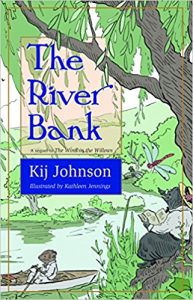 And then there was short fiction. I spent a lot of my time during 2017 reading short fiction – anthologies, collections, magazines, ebooks, uploads, downloads, work put right in front of you and work hidden in nooks and crannies, and probably stuff written on the back of napkins at Worldcon restaurants. It was everywhere and some of it was good. You can see a full list in Recommended Reading, which I compiled with a bunch of Locus colleagues and friends, but here are my own thoughts: it was a good year, with smart, incisive fiction coming from across the globe. It was easy to miss outstanding short fiction in the blizzard of new work, but it was there. The two best anthologies of the year, often the easiest places to find new fiction, were veteran Gardner Dozois’s epic swords and sorcery anthology, The Book of Swords, which featured great fiction from Scott Lynch, Kate Elliott, Ken Liu, Daniel Abraham, and others, and Mahvesh Murad & Jared Shurin’s The Djinn Falls in Love, a cornucopia of djinn stories from Saad Z. Hossein, Amal El-Mohtar, K.J. Parker, and others. Both of these books belong on awards ballots and provide some great reading. The best science fiction anthology of the year was Nick Gevers’s Extrasolar, which featured top notch fiction from Nancy Kress, Alastair Reynolds, and Robert Reed, though I also enjoyed John Joseph Adams’s Cosmic Powers and William Schafer & Dave McKean’s The Weight of Words, which respectively featured strong work from Charlie Jane Anders and Tobias S. Buckell, and Alastair Reynolds and Catherynne Valente. There were a lot of oddball one shots and examples of think-tank projects, including fiction one shots from The Boston Review and Wired. The best of these was probably Kathryn Cramer’s A Flight to the Future, a promotional website for a Japanese airline, which featured strong work, and David Brin & Stephen Potts’s Chasing Shadows, a think-tank anthology with good stories by Karl Schroeder and others.
And then there was short fiction. I spent a lot of my time during 2017 reading short fiction – anthologies, collections, magazines, ebooks, uploads, downloads, work put right in front of you and work hidden in nooks and crannies, and probably stuff written on the back of napkins at Worldcon restaurants. It was everywhere and some of it was good. You can see a full list in Recommended Reading, which I compiled with a bunch of Locus colleagues and friends, but here are my own thoughts: it was a good year, with smart, incisive fiction coming from across the globe. It was easy to miss outstanding short fiction in the blizzard of new work, but it was there. The two best anthologies of the year, often the easiest places to find new fiction, were veteran Gardner Dozois’s epic swords and sorcery anthology, The Book of Swords, which featured great fiction from Scott Lynch, Kate Elliott, Ken Liu, Daniel Abraham, and others, and Mahvesh Murad & Jared Shurin’s The Djinn Falls in Love, a cornucopia of djinn stories from Saad Z. Hossein, Amal El-Mohtar, K.J. Parker, and others. Both of these books belong on awards ballots and provide some great reading. The best science fiction anthology of the year was Nick Gevers’s Extrasolar, which featured top notch fiction from Nancy Kress, Alastair Reynolds, and Robert Reed, though I also enjoyed John Joseph Adams’s Cosmic Powers and William Schafer & Dave McKean’s The Weight of Words, which respectively featured strong work from Charlie Jane Anders and Tobias S. Buckell, and Alastair Reynolds and Catherynne Valente. There were a lot of oddball one shots and examples of think-tank projects, including fiction one shots from The Boston Review and Wired. The best of these was probably Kathryn Cramer’s A Flight to the Future, a promotional website for a Japanese airline, which featured strong work, and David Brin & Stephen Potts’s Chasing Shadows, a think-tank anthology with good stories by Karl Schroeder and others.
You can’t have a good year, or years, for short fiction, as we have had of late, and not see some fine short story collections published, and this year featured a number of outstanding books that belong on your bookshelf. My favorite collection of the year was Christopher Rowe’s first full-length short story collection, Telling the Map, which featured ten stories that were regional and personal. Whether writing science fiction, fantasy, or something else, Rowe’s stories are always personal, intimate, and part of the landscape they arise from. His new novella, “The Border State” was a large part of Telling the Map, and was one of the year’s finest novellas too. Essential; it comes with my highest recommendation. Equally essential was Carmen Maria Muchado’s powerful, intense, and disturbing debut, Her Body and Other Parties, which fully deserved its National Book Award nomination. I came late in the year to M. John Harrison’s You Should Come With Me Now, but this collection of stories, fragments, and such manages to come together into one of the year’s very best books, which really isn’t surprising when you consider Harrison’s body of work. These three weren’t the only worthwhile collections, though. Every year or so Caitlín R. Kiernan, the dark bard of Providence, assembles a new collection of stories originally published in her Sirenia Digest and elsewhere, and each year that book stands with the year’s best. This year’s Dear Sweet Filthy World shows Kiernan deepening and maturing as a writer, and is truly remarkable. I also loved Ellen Klages’s Wicked Wonders. I am perhaps biased, having been the commissioning editor on a number of these stories, but new novelette “Woodsmoke” is a highlight of the year, even if it’s not genre at all, and the rest of the stories are as good. Naomi Kritzer delivered a strong book in Cat Pictures Please and Other Stories, as did Sofia Samatar, with her Tender, which features some excellent work, including the eponymous novella. Also highly recommended are Peter S. Beagle’s The Overneath, and Jack Dann’s Camp Concentration, which was published on the cusp of the new year and featured Dann’s harrowing Holocaust stories. Perhaps sometimes overlooked after having abandoned New York state for Melbourne, Dann really is on song here.
Because I moonlight as a commissioning editor, I find myself compromised when recommending the best novellas of the year, especially when I think the books I edited belong on that list, so take these recommendations with that caveat in mind. Ellen Klages had, I think, her finest moment so far in the sensitive and beautifully wrought Passing Strange, which was nothing less than a love letter to her adopted city of San Francisco, while Caitlín R. Kiernan’s Agents of Dreamland was a Lovecraftian tour de force. I’ve already recommended Christopher Rowe’s “The Border State”, but also standing amongst the year’s best SF novellas are Dave Hutchinson’s dark inversion of space opera, Acadie, Nnedi Okorafor’s Binti: Home, Martha Well’s All Systems Red, and Gwyneth Jones’s Proof of Concept, while Jeffrey Ford’s The Twilight Pariah, Peter Straub’s The Process (is a Process All Its Own), Stephen Graham Jones’s Mapping the Interior, and K.J. Parker’s Mightier than the Sword stood as the year’s best fantasy/horror stories. I’d also give the highest recommendation to Silvia Moreno-Garcia’s novella, Prime Meridian, a subtle and powerful tale of Mars, movies, and Mexico City which stands amongst the best novellas of the past few years.
So, all in all, a good year. Far too much to read, which is all you could want. Everything any reader could want, and far, far more. And 2018 is already shaping up to match or even exceed it. On to next year!
This review and more like it in the February 2018 issue of Locus.




